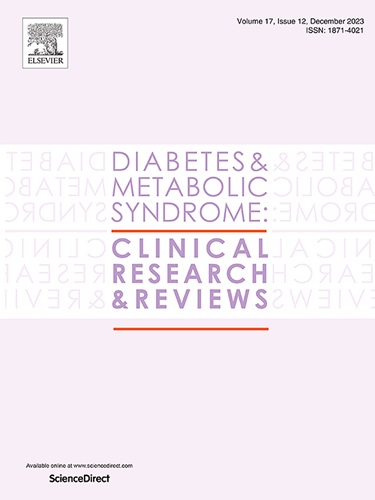生活方式干预对预防2型糖尿病和通过糖尿病前期表型恢复到正常血糖的影响:随机对照试验的系统回顾和荟萃分析
IF 3.4
Q1 ENDOCRINOLOGY & METABOLISM
Diabetes & Metabolic Syndrome-Clinical Research & Reviews
Pub Date : 2025-01-01
DOI:10.1016/j.dsx.2025.103184
引用次数: 0
摘要
目的:探讨生活方式干预对2型糖尿病(T2D)预防和糖尿病前期表型恢复正常血糖的影响。方法:我们检索MEDLINE、Embase和Cochrane图书馆的随机对照试验(rct),这些试验评估了生活方式干预对成年糖尿病前期患者至少持续一年的影响。两位审稿人独立筛选文章、提取数据并进行质量评估。采用随机效应模型分析相对效应,采用亚群分析探讨亚群间潜在效应。结果:共纳入31项随机对照试验,共纳入受试者23684人。与常规护理相比,生活方式干预使糖尿病前期成人T2D发生率降低了41% (RR 0.59 [95% CI 0.52-0.68]),使血糖恢复正常的概率提高了44% (RR 1.44 [95% CI 1.15-1.81])。空腹血糖受损(IFG5.6)/糖耐量受损(IGT)与IFG6.1/IGT之间无显著差异(P = 0.752)。IGT + IFG在预防T2D方面比单独IGT获益更多(right + IFG 0.47 [95% CI 0.41-0.55];RRisolatedIGT 0.77 [95% CI 0.64-0.93]),而孤立的IFG (RR 0.77 [95% CI 0.51-1.16])或升高的HbA1c (RR 0.89 [95% CI 0.74-1.07])没有发现益处。结论:生活方式干预有助于预防糖尿病前期成人患者的T2D并恢复到正常血糖水平,对IGT患者有显著益处,但对孤立性IFG或HbA1c升高的患者没有显著益处。本文章由计算机程序翻译,如有差异,请以英文原文为准。
Effects of lifestyle interventions on the prevention of type 2 diabetes and reversion to normoglycemia by prediabetes phenotype: A systematic review and meta-analysis of randomized controlled trials
Objective
To explore the effects of lifestyle interventions on the prevention of type 2 diabetes (T2D) and reversion to normoglycemia by prediabetes phenotype.
Methods
We searched MEDLINE, Embase, and the Cochrane Library for randomized controlled trials (RCTs) that evaluated the effects of lifestyle interventions in adults with prediabetes for a minimum duration of one year. Two reviewers independently screened articles, extracted data, and performed quality assessment. The relative effects were analyzed using a random-effects model, subgroup analysis was employed to explore the potential effects among subpopulations.
Results
A total of 31 RCTs involving 23684 participants were analyzed. Compared with usual care, lifestyle interventions reduced the incident T2D by 41 % (RR 0.59 [95 % CI 0.52–0.68]) and increased the probability of reverting to normoglycemia by 44 % (RR 1.44 [95 % CI 1.15–1.81]) in adults with prediabetes. No significant difference was observed between the impaired fasting glucose (IFG5.6)/impaired glucose tolerance (IGT) and IFG6.1/IGT (P = 0.752). IGT + IFG benefited more than isolated IGT in prevention of T2D (RRIGT + IFG 0.47 [95 % CI 0.41–0.55]; RRisolated IGT 0.77 [95 % CI 0.64–0.93]), whereas no benefit was found in isolated IFG (RR 0.77 [95 % CI 0.51–1.16]) or elevated HbA1c (RR 0.89 [95 % CI 0.74–1.07]).
Conclusions
Lifestyle intervention could help prevent T2D and revert to normoglycemia in adults with prediabetes, with significant benefit in people with IGT but not in those with isolated IFG or elevated HbA1c.
求助全文
通过发布文献求助,成功后即可免费获取论文全文。
去求助
来源期刊

Diabetes & Metabolic Syndrome-Clinical Research & Reviews
ENDOCRINOLOGY & METABOLISM-
CiteScore
22.90
自引率
2.00%
发文量
248
审稿时长
51 days
期刊介绍:
Diabetes and Metabolic Syndrome: Clinical Research and Reviews is the official journal of DiabetesIndia. It aims to provide a global platform for healthcare professionals, diabetes educators, and other stakeholders to submit their research on diabetes care.
Types of Publications:
Diabetes and Metabolic Syndrome: Clinical Research and Reviews publishes peer-reviewed original articles, reviews, short communications, case reports, letters to the Editor, and expert comments. Reviews and mini-reviews are particularly welcomed for areas within endocrinology undergoing rapid changes.
 求助内容:
求助内容: 应助结果提醒方式:
应助结果提醒方式:


